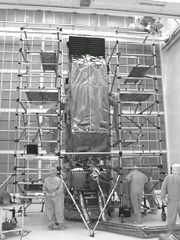Search for the beginning
 scientists will soon have a new tool to search for the "fossil record' of the Big Bang and uncover clues about the evolution of the Universe. Scheduled to be launched on June 23, National Aeronautic and Space Administration's ( nasa ) Far Ultraviolet Spectroscopic Explorer ( fuse ) will observe nearby planets and the extreme reaches of the Universe. It will also provide a detailed picture of the immense structure of our own Milky Way.
scientists will soon have a new tool to search for the "fossil record' of the Big Bang and uncover clues about the evolution of the Universe. Scheduled to be launched on June 23, National Aeronautic and Space Administration's ( nasa ) Far Ultraviolet Spectroscopic Explorer ( fuse ) will observe nearby planets and the extreme reaches of the Universe. It will also provide a detailed picture of the immense structure of our own Milky Way.
The mission's primary scientific focus will be the study of hydrogen and deuterium (a different form of hydrogen), which were created shortly after the Big Bang. The fuse satellite consists of two sections: the spacecraft and the science instrument. The spacecraft, built by Orbital Sciences Corporation, Germantown, usa, contains all the elements necessary for powering the satellite.
The spacecraft and the science instrument each have their own computers which will coordinate the activities of the satellite. With this information, astronomers will be able to look back in time when the Universe was still in its infancy. By examining these earliest relics of the birth of the Universe, astronomers hope to understand the processes that led to the formation and evolution of stars, including our solar system. Ultimately, scientists hope that data from fuse will help them take a huge leap forward in understanding how the primordial elements were created and their distribution since the beginning of time. "We think that as stars age, deuterium is destroyed,' said nasa 's George Sonneborn of the Goddard Space Flight Center in Greenbelt. "Mapping deuterium throughout the Milky Way will give us a better understanding of how elements are mixed, distributed and destroyed,' said Sonneborn.
"The big questions are these: Do we understand the origins of the universe, and do we understand how galaxies evolve?' said Kenneth Sembach, a member of the fuse science team from the Johns Hopkins University, Baltimore, usa . "Because fuse can observe ultraviolet light that other telescopes cannot, we can test in unique ways how deuterium and other elements are circulated within galaxies. That, in turn, may test the limits of the Big Bang theory,' said Sembach. Among the cosmic questions fuse will tackle are: the conditions in the first few minutes after the Big Bang; will studying the
Related Content
- Search restarts for area willing to host highly radioactive UK waste
- Bangladesh State of Environment Report: The Monthly Overview, October, 2013
- Cumbria councils vote over nuclear waste project
- CBI begins search operations at iron ore exporters, miners
- Elephant Census to begin from June 1
- Meet on N-E development
